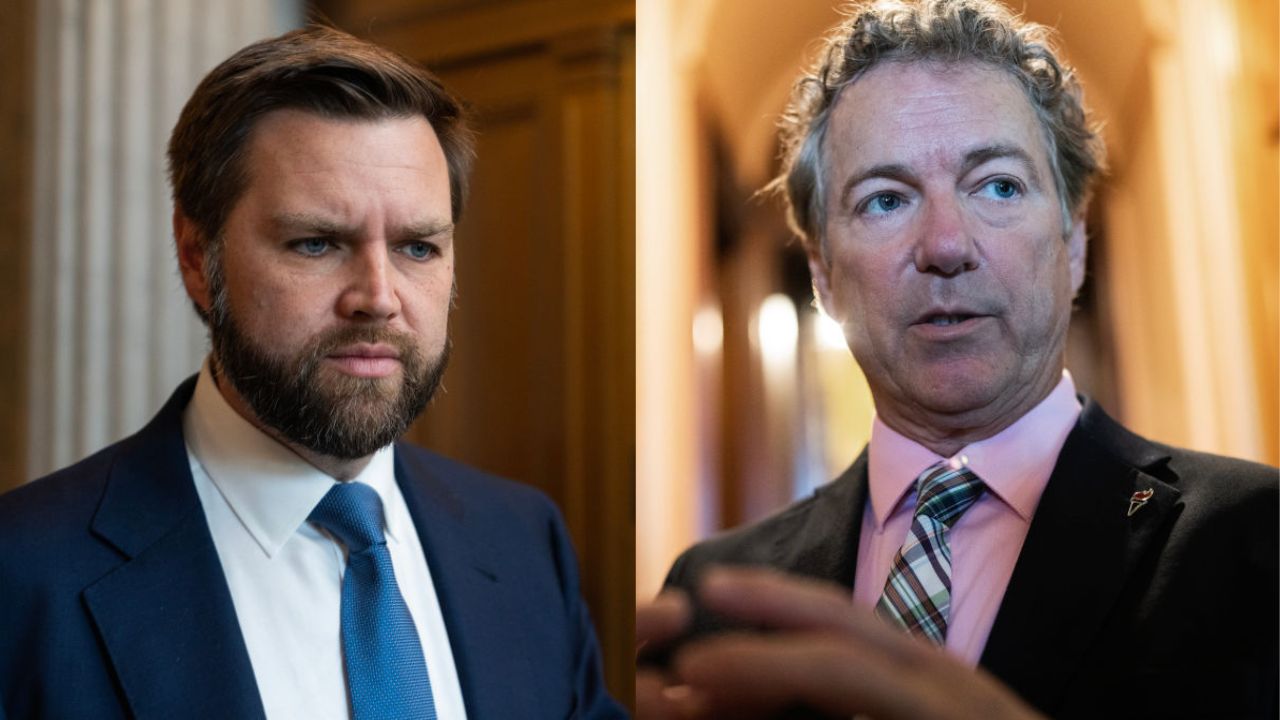PRESENTED BY

THE TOP

Happy Thursday morning.
From Sen. Tommy Tuberville’s (R-Ala.) military promotions blockade to a long-stalled Labor secretary nominee, the Senate is clearly not friendly territory for the Biden administration.
And now, there are new roadblocks from Sens. J.D. Vance (R-Ohio) and Rand Paul (R-Ky.) that are making the Senate close to unworkable for the State Department.
Nearly three dozen nominees to serve as U.S. ambassadors — almost all of them career Foreign Service officers — are stalled on the Senate floor, in addition to nominees to represent the United States on international commissions. This is according to the American Foreign Service Association and the Senate Foreign Relations Committee’s records.
Vance’s and Paul’s holds — centering on diversity initiatives and Covid-19 origins, respectively — are preventing the swift confirmation that is customary for career diplomats, forcing leadership to use floor time. And with the Senate racing to complete the defense authorization bill and fund the government before the end of the fiscal year, a traffic jam on the Senate floor means their confirmations are indefinitely on hold.
“China, Russia, almost no country has to go through a process like this,” said a senior administration official who was granted anonymity to candidly discuss the nominations. “So we do have a situation where even more adversarial countries have more direct lines to the leadership in foreign countries and we do not.”
Of course, Senate leaders could go through the procedural motions to confirm these nominees, but that would take weeks. The same is the case for the senior-level military promotions that Tuberville is blocking. Senate Majority Leader Chuck Schumer on Wednesday left the door open to keeping the Senate in session in August to process them.
Now, top Democrats are calling for Schumer to do just that when it comes to the ambassadorial nominees that remain stalled.
“We’ve got to be willing to stay through the August recess or through weekends in order to move these ambassadors,” Sen. Chris Murphy (D-Conn.) told us. “I understand this is a topic the public doesn’t easily connect to, but it harms our national security. But it’s not rocket science. We just have to be willing to put in the time.”
Canceling August recess — or even just a part of it — is considered to be an extreme step in the Senate. But sometimes simply the threat alone is enough to move senators off their objections.
If that doesn’t work, some senators speculated to us that the administration might not even want to send nominees for certain positions — like the critical and soon-to-be-vacant U.S. ambassador to Israel job — given the Senate’s paralysis. That would mean relying on a chargé d’affaires to carry out the business of an ambassador.
“We delude ourselves into thinking that chargés have the kind of access that ambassadors do,” Murphy added. “They don’t.”
Foreign Relations Committee Chair Bob Menendez (D-N.J.) told us that given the administration’s “problems with nominations at large,” they’ll “have to decide what to use capital on.”
The senior administration official pushed back on the idea of not sending nominees to the Hill, adding: “We actually don’t have the luxury of not nominating folks. At the very least, we have to send a signal that we are prepared to send somebody.”
The U.S. ambassador to Israel post, among others, is viewed as being worth the fight given its importance in U.S. diplomacy. President Joe Biden’s top ally in the upper chamber, Sen. Chris Coons (D-Del.), told us that not nominating someone for this or other positions “would be essentially admitting defeat.”
“The headwinds are very specific… And I think the State Department is doing exactly what they need to do, engaging on different issues with each senator,” Coons added. “It is just not acceptable [that] dozens and dozens of critical allies have no confirmed ambassador.”
Looming Senate recesses often serve as an opportunity for party leaders to unlock stalled nominees by striking deals with the holdouts. And with the August recess set to begin at the end of next week, Schumer could threaten to keep the chamber in session absent an agreement to confirm a group of nominees.
“I hope there will be a chance during the next week to clear a majority of these nominees,” Sen. Ben Cardin (D-Md.), who chairs the subcommittee that oversees the State Department’s operations, told us. “There aren’t a lot of substantive objections. This is just to clog up the process.”
This year in particular has been a slog for the State Department. The Senate has confirmed just five State nominees this year. Democratic leadership had to use floor time for four of them due to GOP objections. So if Schumer didn’t file cloture on those nominees, the Senate would have only confirmed one State Department nominee to date this Congress. Typically, career diplomats and noncontroversial nominees are confirmed via unanimous consent soon after they’re approved in committee.
Secretary of State Antony Blinken said this week that Egypt, Israel, Jordan and Lebanon will not have confirmed ambassadors by the end of the summer. In a letter to senators, he wrote that the pace of confirmations in the 118th Congress “has significantly stalled.”
This is far from the first time the State Department has dealt with this type of senatorial leverage under Biden.
During the president’s first year in office, Sen. Ted Cruz (R-Texas) was holding up all ambassador nominees as a way to force the administration to impose sanctions on Russia’s Nord Stream 2 pipeline. Now the Pentagon is dealing with the same from Tuberville, who’s blocking routine military promotions in order to force a reversal of the Pentagon’s abortion policy.
But there’s a key difference this time. In 2021, Cruz and other Republicans worked directly with the State Department to release holds on individual nominees. This time, that process is basically non-existent.
Democrats view all of this as an effort by Republicans to use national security as a cudgel to hurt Biden politically. Republicans see it as a proper use of their authority as senators, and note that lawmakers from both parties routinely resort to these tactics, despite the unprecedented nature of Tuberville’s holds in particular.
Senate Minority Leader Mitch McConnell gave the clearest sign yet on Wednesday that the blockades created by Tuberville and others might drag on for a while, as Democrats from Schumer to Biden call on the GOP leader to step in.
McConnell, who has said he opposes Tuberville’s tactics, told reporters he’d be “reluctant” to do anything that would “dramatically reduce the uniqueness of the Senate, which is that every single member can have an impact.”
In other news: The House resoundingly rejected an effort to add flights to Washington Reagan National Airport. The vote was 205-229. This is a massive win for United, American and Alaska and a defeat for Delta, which propped up an outside group to push for this change.
This effort is dead for this year. And perhaps for longer.
— Andrew Desiderio
Today: Punchbowl News founder and CEO Anna Palmer sits down with leaders of the House China Select Committee Rep. Mike Gallagher (R-Wis.) and Raja Krishnamoorthi (D-Ill.) at 12 p.m. ET. They’re going to discuss the race to protect and modernize the national supply chain. It’s not too late to RSVP!
PRESENTED BY PRATT & WHITNEY, AN RTX BUSINESS
The Department of Defense chose Pratt & Whitney’s F135 Engine Core Upgrade, because it’s the fastest, lowest-risk F-35 engine modernization option with $40 billion in lifecycle cost savings. It also meets or exceeds all of the F-35’s Block 4 and beyond power and cooling needs. The F135 program supports nearly 55,000 jobs in the U.S. across 41 states and more than 260 suppliers, and it is the smart decision for the F-35.

Punchbowl News Q&A: CFPB’s Chopra talks Congress, late fees and more
Twelve years ago this Friday, the Consumer Financial Protection Bureau opened for business.
To this day, the agency represents some of the most significant reforms undertaken by Congress in the wake of the Global Financial Crisis — and its future has probably never been more in doubt, thanks to the Supreme Court.
We sat down with CFPB Director Rohit Chopra this week to discuss the agency’s future, relationship with Congress and policymaking under the Biden administration.
Here are some key takeaways:
Oversight: It’s no secret that House Republicans don’t exactly love the CFPB. The agency stood up an office solely to deal with congressional inquiries in July 2022. But Chopra says he doesn’t mind. “I never like to treat Congress as some sort of monolith,” he told us.
Plus, behind the scenes — and away from the headlines — Chopra said he had been “actually surprised at the level of common ground” he has found with Democrats and Republicans alike since he became the agency’s director.
“The work we have been doing, especially on Big Tech entering financial services, expanded use of AI, the broader surveillance of our personal financial data, open banking — these are issues that there’s an enormous amount of seeing eye-to-eye on.”
Speaking of AI: Chopra sees a role for Congress to play, but he argued federal regulators should “first really look in inventory of the existing laws we have” and see what might already apply to the rapidly developing sector.
Financial regulators, including the CFPB, have had something of a head start in artificial intelligence policy, where they’ve had to contend with algorithmic credit modeling, banker chatbots and more.
But the impact of AI products that mimic people’s voices or faces could drastically worsen fraud, and Congress will likely need to step in, Chopra said.
“How we consider the future of fraud and the use of biometric markers, facial recognition, voice recognition — we will probably need Congress to think through what is the future of identity verification, because that’s something so critical to financial services and really across the economy.”
Credit card fees: A proposed rulemaking to sharply limit how much financial services firms can charge in credit card late fees is one of the industry’s most pressing concerns today. Many credit card companies would see their fees capped at just $8 — down from $30-40 — unless they could prove a higher fee is in line with their costs.
While that proposal still has to be finalized, Chopra held back nothing when we pressed him on the policy.
“I don’t think anyone wants a credit card market where the lender is rooting for the borrower to be late,” Chopra said.
“If there is indeed legitimate fear among the credit card industry and not just from their lobbyists,” the CFPB director added, “perhaps that is a sign that they have been relying for their core profit model on penalty fees, which is almost exactly what the CARD Act seemed to ban.”
The future of the CFPB: The agency and its senior officials have always been hesitant to talk about its legal battles, of which there have been many. The Supreme Court battle we’ll see this fall is perhaps the direst, cutting to the core of how the agency receives its funding through the Federal Reserve.
But in the meantime, House Republicans are waiting in the wings with legislation that changes the CFPB’s funding structure anyway, making the agency subject to the annual appropriations process and setting it up for protracted battles over its budget.
When we asked Chopra what the loss of regulatory independence would mean for the CFPB, he pointed to history.
“I think there has been a realization from the time of Lincoln that we would not benefit from excessive or erratic funding when it comes to policing the financial system,” Chopra said. President Abraham Lincoln stood up the nation’s first national bank regulator in 1863.
Chopra also raised the possibility that if the CFPB’s funding is found unconstitutional, the decision could eventually affect “a substantial number of agencies that have the same exact contours of funding that is established by Congress.”
“It’s hard to predict the range of negative consequences from that, drawing into question the validity of past actions and rules,” Chopra said. “I think many in the financial industry will privately tell you, ‘We know our lobbyists are pushing for this, but we’ve got to be careful what we wish for.'”
— Brendan Pedersen
FY2024 WATCH
Appropriators in denial of conservative shutdown threat
House GOP appropriators look like they’re in for a rude awakening.
The general consensus in the Capitol is that a government shutdown is likely at some point this fall.
But appropriators are adamant a shutdown is off the table, even as hardline conservatives demand steep spending cuts the Senate will never support.
With a Sept. 30 deadline looming, GOP negotiators are warning the right flank of their party not to threaten a government shutdown.
“There’s not going to be a government shutdown,” House Appropriations Committee Chair Kay Granger (R-Texas) told us.
Alex Attebery, spokesperson for Granger, later added in a statement that the chair is “committed to finding a responsible path forward to fund the government and avoid a shutdown.”
Rep. Stephanie Bice (R-Okla.), a member of the Appropriations Committee, criticized her colleagues who have openly said they’d support shutting down the government.
“Forcing a government shutdown is not in the best interest of the country,” Bice told us. “You would see a CR long before you would see a government shutdown.”
By the way, we may see a CR and a government shutdown.
Speaker Kevin McCarthy acquiesced to hardliner demands to fund the government at FY2022 levels, $130 billion less than agreed to in the debt-limit compromise with the White House.
Senate appropriators, meanwhile, are marking up their bills to levels mandated in the Fiscal Responsibility Act and have said they won’t go along with the House’s cuts. Conservatives are vowing not to back down on their demands, setting up a showdown in September.
Roughly 20 House conservatives wrote to McCarthy earlier this month, saying they will vote against funding bills if their demands aren’t met. Freedom Caucus Chair Scott Perry (R-Pa.) and Chip Roy (R-Texas) led the letter, which also included members outside of the group.
The lawmakers warned they would vote against any bill that does not match FY2022 funding levels agreed upon in the debt-limit negotiations. And while some conservatives have argued they’re not threatening to shut down the government, others have openly embraced the idea.
“I’m not afraid of a shutdown,” Rep. Eric Burlison (R-Mo.) told us.
Rep. Tim Burchett (R-Tenn.) said a shutdown “doesn’t bother him.”
Even some sitting members of the Appropriations Committee have argued that a shutdown wouldn’t be the worst case scenario in order to slash government funding.
“It doesn’t shut down 75% of the government plus, so all that it really hurts is the military and those types of areas that is an unintended consequence,” Rep. Ryan Zinke (R-Mont.) told us. “It’s a lot of show, no substance.”
Rep. Michael Cloud (R-Texas), a Freedom Caucus member who sits on the panel, said “the long-term win” of achieving conservatives’ desired spending cuts would outweigh any short-term discomfort.
“We’ve got to be willing to stand strong on those principles even if it means a difficult news cycle or the way people are going to spend things for a couple weeks,” Cloud told us.
McCarthy has vowed to get all 12 appropriations bills through the House. He said Wednesday it is his “intention and hope” that Congress will fund the government by Sept. 30.
The House Appropriations Committee might not even be able to bring two of the most controversial bills — Labor-HHS and Commerce-Justice-Science — up for a full committee vote.
Several House conservatives sit on the Appropriations Committee, which has pushed it to the right. The panel currently has four HFC members on it, including Cloud and Reps. Andy Harris (R-Md.), Ben Cline (R-Va.) and Andrew Clyde (R-Ga.).
And some members of the committee nearly came to blows earlier this week over a GOP amendment to strip funding for three LGBTQ community centers during a markup of the Transportation-HUD bill.
Democrats, meanwhile, are already trying to blame any potential shutdown on Republicans.
Appropriations Committee Ranking Member Rosa DeLauro (D-Conn.) accused House Republicans of reneging on the agreement put in place by McCarthy.
“They are leading us straight to a shutdown and will only have themselves to blame when we’re there,” DeLauro told us in a statement. “I didn’t vote for the debt limit bill, because the bill includes caps, and caps are cuts. But I respect the law and believe we should be following it instead of threatening to shut down the government.”
— Mica Soellner
THE CAMPAIGN
Dan Goldman headlining Replace Sinema PAC event
Rep. Dan Goldman (D-N.Y.), famous for his role as self-appointed chair of the Bagel Caucus, is headlining an event for the Replace Sinema PAC, an organization dedicated to defeating Sen. Kyrsten Sinema (I-Ariz.). Goldman is one of four members of Congress to endorse Rep. Ruben Gallego (D-Ariz.), along with former Speaker Nancy Pelosi and Reps. Raúl Grijalva (D-Ariz.) and Seth Moulton (D-Mass.).

— Jake Sherman
DOWNTOWN DOWNLOAD
The Bay Area Host Committee, which is charged with bringing big-time events to the San Francisco Bay Area, has hired Foley & Lardner and former Rep. Dennis Cardoza (D-Calif.) to lobby on “government funding opportunities.”
— Jake Sherman
MOMENTS
9 a.m.: President Joe Biden will get his daily intelligence briefing.
10:20 a.m.: Biden will leave for Joint Base Andrews, where he will fly to Philadelphia. Olivia Dalton will brief on Air Force One.
10:45 a.m.: House Minority Leader Hakeem Jeffries will hold his weekly news conference.
12:05 p.m.: Biden will get a tour of Philly Shipyard and speak at 1 p.m. about “Bidenomics.”
2:15 p.m.: Biden will leave Philadelphia for D.C. He’s slated to be back at the White House at 3:30 p.m.
CLIP FILE
NYT
| → | News Analysis: “Trump’s Legal Woes Mount as Trial Dates and Campaign Calendar Collide,” by Charlie Savage |
Editorial photos provided by Getty Images. Political ads courtesy of AdImpact.
PRESENTED BY PRATT & WHITNEY, AN RTX BUSINESS
The Department of Defense chose Pratt & Whitney’s F135 Engine Core Upgrade, because it’s the fastest, lowest-risk F-35 engine modernization option with $40 billion in lifecycle cost savings. It also meets or exceeds all of the F-35’s Block 4 and beyond power and cooling needs. The F135 program supports nearly 55,000 jobs in the U.S. across 41 states and more than 260 suppliers, and it is the smart decision for the F-35.
Live sports streaming has driven many of the top 10 Internet traffic events in Comcast network history in just the past two years alone. Comcast is innovating its network so fans can stream the biggest moments in sports with the most reliable connection and ultra-low latency.

Crucial Capitol Hill news AM, Midday, and PM—5 times a week
Join a community of some of the most powerful people in Washington and beyond. Exclusive newsmaker events, parties, in-person and virtual briefings and more.
Subscribe to Premium
The Canvass Year-End Report
And what senior aides and downtown figures believe will happen in 2023.
Check it outEvery single issue of Punchbowl News published, all in one place
Visit the archiveLive sports streaming has driven many of the top 10 Internet traffic events in Comcast network history in just the past two years alone. Comcast is innovating its network so fans can stream the biggest moments in sports with the most reliable connection and ultra-low latency.










